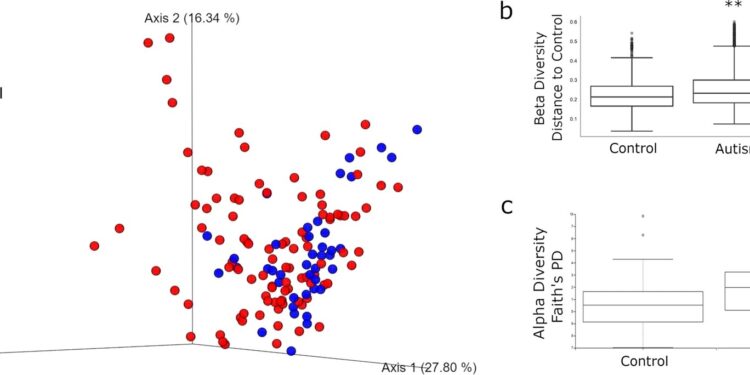Beta and alpha diversity of the microbiome compared according to ASD diagnosis. A PCoA plot of all samples. Control samples are blue while ASD samples are red. b Analysis of beta diversity as differences between each sample and control samples. There is a significant difference in beta diversity between ASD and control groups (PERMANOVA p = 0.002). Box plots representing quartiles. vs Alpha diversity analysis using Faith’s PD. Alpha diversity is increased in the ASD group (PERMANOVA p= 0.005) Box and whisker plots. The midline is nasty. Boxes represent maximum and minimum quartiles and whiskers. Points outside the whiskers are outliers. **=p < 0.01 PERMANOVA. Credit: npj Biofilms and microbiomes(2023). DOI: 10.1038/s41522-023-00469-2
Autism spectrum disorder (ASD), a neurodevelopmental condition characterized by decreased social communication and repetitive behaviors, has long intrigued scientists seeking to elucidate its underlying mechanisms. Researchers at the Azrieli Faculty of Medicine at Bar-Ilan University have now identified a potential link between ASD and the composition of the gut microbiome.
Researchers analyzed gut microbiome diversity in an Israeli cohort of 96 people diagnosed with ASD and 42 neurotypical people. Their conclusions, recently published in the journal npj Biofilms and microbiomeshighlight significant differences in alpha and beta diversity in people with ASD and identify specific types of bacteria found in greater abundance in people with autism.
Key findings include an unexpected increase in alpha diversity, a measure of microbial diversity, and a notable increase in the relative abundance of the phylum Bacteriodetes and the genus Bacteroides in individuals with ASD. Traditionally, decreased alpha diversity has been associated with compromised health in various conditions.
However, the increased alpha diversity observed in the ASD cohort challenges prevailing notions, particularly given its potential link to neurological diseases. Bacteroides, normally found in the human gut microbiome, can have a detrimental impact on health when they increase in abundance.
To study the potential functional consequences of these microbiome changes, the researchers conducted experiments on newborn mice. Mice treated with Bacteroides fragilis at birth showed dysfunction in social behavior, increased repetitive behaviors, and dysregulation of gene expression.
“Our research suggests that an overabundance of Bacteriodes, particularly early in life, could have functional consequences for people with ASD. This sheds new light on the complex interplay between the microbiome and neurodevelopment in people with ASD,” said the study’s lead researcher, Prof. Evan Elliott, from the Azrieli Faculty of Medicine at Bar-Ilan University. The study was carried out in collaboration with Professor Omry Koren, microbiome expert at the Azrieli Faculty.
Intriguingly, these effects were observed primarily in male mice, with female mice showing no behavioral deficits, suggesting that males may be more sensitive to environmental factors contributing to ASD. The research highlights the importance of further investigation into sex-specific aspects of ASD and the potential role of microbial composition.
The implications of this research extend beyond the laboratory, providing potential avenues for further exploration of the long-term effects of microbial interventions during early developmental stages and their implications for brain development.
More information:
Julie Carmel et al, Bacteroides is increased in an autism cohort and induces autism-related behavioral changes in mice in a sex-dependent manner, npj Biofilms and microbiomes(2023). DOI: 10.1038/s41522-023-00469-2
Provided by Bar-Ilan University
Quote: Study reveals changes in the microbiome linked to autism spectrum disorders (February 12, 2024) retrieved February 12, 2024 from
This document is subject to copyright. Apart from fair use for private study or research purposes, no part may be reproduced without written permission. The content is provided for information only.



